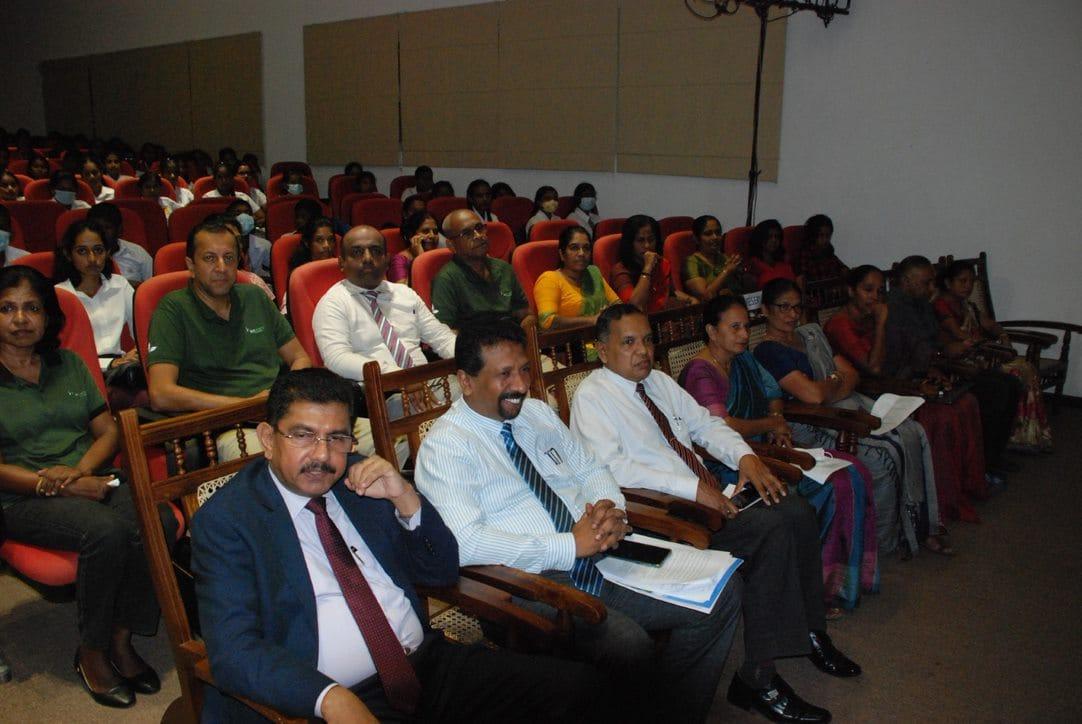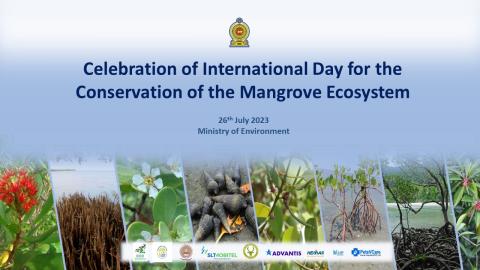International Mangrove Ecosystem Conservation Day July 26, 2023- Sri Lanka
International Mangrove Ecosystem Conservation Day 2023
Background
Mangrove is the only tree that grows in saltwater. Mangrove forest is a rare but spectacular and prolific ecosystem, which is usually found along sheltered coastlines in the tropical and sub-tropical regions. Globally, mangrove forests represent less than 1% of all tropical forests and less than 0.4% of the total forest estate. However, mangrove forests are extraordinary, with some featured and even unique functions:
- Mangroves can offer a considerable array of ecosystem goods and services, so contribute to the wellbeing, food security, and protection of coastal communities.
- Mangroves can protect coastlines from storm surges, tsunamis, and rising sea levels. They also protect coral reefs, sea grass beds and shipping lanes against siltation and erosion. Thus, mangroves increase resilience to natural hazards.
- Mangroves can support or conserve a rich biodiversity, since they provide nursery habitat, spawning grounds and nutrients for a variety of fish, shellfish, migratory birds, and insects as well as countless endangered mammals, reptiles, and amphibians.
- Mangroves are also an important tool in the fight against climate change. They take up to five times more carbon out of the atmosphere than forests on land.
Despite Sri Lanka being a medium-sized island, numerous distinct ecosystems can be found in a relatively small space. Among them, the mangrove ecosystem has been identified as a highly threatened ecosystem, although it is an extremely important, rare ecosystem with a low distribution.
In Sri Lanka, 21 true mangroves and mangrove associates have been identified. In Here, the most significant fact is although one third of the world's mangrove species are represented in Sri Lanka's ecosystems, 10 of the 21 true mangrove species have been threated. Nowadays this unique ecosystem become a highly threatened due to various human activities. Among them clearance of mangrove forests, reclamation projects, solid waste disposal, conversion of mangrove swamps to aquaculture systems and salterns and unsustainable coastal developments serves a major threats.
Accordingly, as the focal point of the Convention on Biological Diversity, the Ministry of and Environment has been implementing programs to aware the state, public and private institutions, school children and the community on conservation and sustainable utilization of Mangrove ecosystems and also Sri Lanka is functioning as leader among the Commonwealth Countries on mangroves conservation.
Furthermore, conservation of the mangrove ecosystem has been highlighted globally as a priority, and the UNESCO Conference held in 2015 aimed to improve awareness of the importance of the unique, special and threatened mangrove ecosystem and inspire solutions for its sustainable management, conservation and use. Every year 26th of July was declared as International Mangrove Ecosystem Conservation Day.
International Mangrove Ecosystem Conservation Day serves as reminder of the crucial role of mangrove ecosystem. Since 2015 various parties, non-governmental organizations and interested stakeholders have come together on 26th July every year around the world to raise awareness and promote the need for international cooperation to conserve the mangrove ecosystem and promote innovative solutions to ensure the sustainable management, conservation and utilization of mangroves by various activities on International Mangrove Ecosystem Conservation day.
Therefore, the Biodiversity Secretariat has been conducted the following program with the collaboration of other relevant parties and scholars to celebrate the International Mangrove Ecosystem Conservation Day.
- National Program :“Let's streamline Future Generations to ensure the survival of mangroves to ensure our survival”
Practical workshop on Conservation and Sustainable Utilization of Mangrove Ecosystem for School Children 26th July, 2023 at 8.30 a.m.
A practical workshop was conducted at the Ministry of Environment premises to educate school students on the importance of mangrove ecosystem, identification of mangrove species, distribution, causes of threats and conservation. The programme was conducted for 200 students and 220 teachers each represented 10 schools in the Western Province.
Objective
The future of the mangrove ecosystems is depending on the knowledge of the future generation and the way they protect their ecosystems. The main objective of this program is to educate the future generation about the value of mangrove existence and create a generation that will protect the mangrove ecosystem.
Here, a practical experience was provided regarding the importance of the mangrove ecosystem, identification of mangrove species, distribution, reasons for being threatened and conservation, and with the contribution of the school students, they drew a picture to represent the value of the mangroves themselves.
With the knowledge gained from this awareness workshop, eco-pilot projects on mangrove conservation were launched and school students, including eco-pilots, were targeted in the hopes of imposing interest in carrying out activities to protect this ecosystem at their level by involving adults as well. It was also expected that the participated students and teachers, together with other government and private institutions, would prepare the necessary background to implement such activities in their schools.
The programme was conducted for 200 students and 220 teachers each represented 10 schools in the Western Province.
Stakeholders
- National Expert Committee on Mangrove Conservation and Sustainable Use and Blue Carbon Ecosystem Task Force
- Managing Together Project, Ministry of Environment
- Wayamba University of Sri Lanka
- HEMAS Private Company
- Hayley's Advantis Private Limited
- The Wildlife and Nature Protection Society and its Youth Wings team
- Young Zoologists Association (YZA)
- Blue Resources Trust Institute
- SLT MOBITEL
- PetsVCare Animal Hospital (Pvt) LTD

2. Two hour “Ayubowan” Documentary program at Jathikarupawahini (23 July 2023)
The Secretary of the Ministry of Environment, a member of the National Expert Committee on Conservation and Sustainable Use of Mangroves, an official of the Department of Forestry and representatives of the private sector conducted this program at the Television Corporation studio.
Furthermore, the Chairman of the National Expert Committee on Mangrove Conservation and Sustainable Use, with the participation of the community in the area, on the restoration of mangroves being carried out in the vicinity of Pubudugama and Anavilundawa mangrove restoration sites, and the environmental, economic and social services provided by the “Gage Wadia” mangrove ecosystem. A recording conducted by Prof. Sevvandi Jayakody was broadcasted on the program Ayubowan.
3. Mangrove Restoration Program – Around Malwatu Oya estuary
Here, mangrove saplings were obtained from a nursery under the Mitsui Cement Factory in Trincomalee and a nursery of Dilmah Institute and under the initiative of the Ministry of Environment, a sapling planting was done at “Silavathura” in Mannar district with the participation of the Department of Forestry, Sri Lanka Navy and the community on 21 July 2023.
(4) With the technical contribution of the Ministry of Environment and the organization of the Dilmah Institute, a mangrove tree planting program was held at Kalipitiya on 14th July 2023 along with an awareness workshop for the Sri Lanka Navy
5) A mangrove planting and awareness program was conducted at Talathuduwa Aranya Senasana near Koggala Lagoon. The program was organized by the Colombo Supreme Lions Club and the Ministry of Environment provided technical assistance. . Mangrove plants and organizational support for this work were provided by Wildlife and Marine Resources Conservation Organization and 75 schools and 25 foreign volunteers participated

